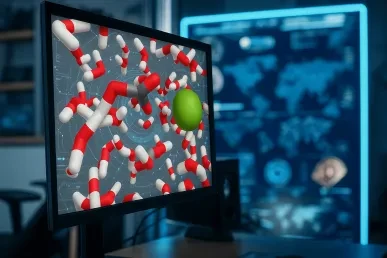La IA ayuda a decodificar cómo se construyen los minerales en la naturaleza
A new study led by Pablo Piaggi, Ikerbasque Research Fellow at CIC nanoGUNE, offers fresh insight into how nature forms minerals thanks to cutting-edge artificial intelligence. Published in the special issue Machine Learning in Chemistry of the Proceedings of the National Academy of Sciences (PNAS), the research demonstrates how machine learning models – AI systems that learn from data – can simulate complex chemical reactions essential to understanding biomineralization (the process by which organisms form minerals like shells and skeletons) and carbon sequestration, a key mechanism in mitigating climate change.

The study focuses on calcium carbonate, a mineral found in seashells, corals, and geological formations. It also plays a pivotal role in capturing atmospheric CO2. While molecular simulations have long been used to study its formation, previous models lacked the precision to capture subtle but critical reactions, such as proton transfer, a fundamental step in crystallization.
To overcome this, Piaggi and colleagues leverage recent advances in artificial intelligence to develop a new machine learning model based on first-principles quantum mechanics. This AI-driven approach not only improves accuracy but also reveals previously hidden details: for example, how the loss of a proton is mediated by the association of the ions.
The implications are significant. This method represents an important step in the ab initio study of chemical reactions in biominerals and their role in crystallization, helping researchers better understand how these processes occur in natural environments like seawater, where conditions are more complex but highly relevant to both biology and climate science.
The Machine Learning in Chemistry Special Feature
The study is part of a broader trend highlighted in PNAS special issue Machine Learning in Chemistry, which showcases how advances in machine learning, data science, and artificial intelligence are rapidly reshaping nearly every area of chemistry. The articles illustrate how these methods are enabling new discoveries in molecular design, reaction prediction, materials development, and more, while outlining key directions for future research in this fast-growing field.
Article reference:
Ab initio machine-learning simulation of calcium carbonate from aqueous solutions to the solid state
Pablo M. Piaggi, Julian D. Gale, and Paolo Raiteri
PNAS, 122, 41 (2025)
https://www.pnas.org/doi/10.1073/pnas.2415663122
